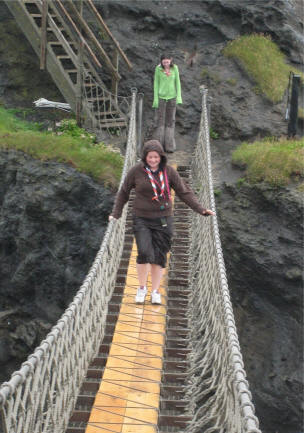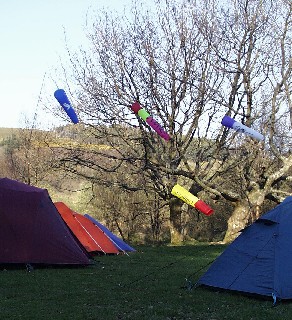|
 History History
: Dolphin's Barn Scout Group
: Coombe Women’s Hospital
: Dolphin’s Barn & Ice Skating
:
Dolphin's Barn and the Irish National Anthem
: Dolphin's Barn Community Garden
: Dolphin's Barn Fire Station
: Dolphin's Barn Public Library
: Dolphin's Barn - where did the name come from?
Dolphin's
Barn Scout Group
The 42nd Dublin Scout Group began its second life in January 2006.
Prior to this Scouting in Dolphin's Barn had existed for a number of
years. Most recently the Scout Centre has been used by a number of
National and Dublin Metropolitan Provincial Teams from Scouting Ireland
including the Training Team, National Venture Scout Team and Water Activities
Team as a city venue for their meetings. The Scout Centre has also been and
continues to be the Dublin Metropolitan Provincial Office of Scouting Ireland
where Ger Smith, the Provincial Support Officer is based. Prior to this
(c. 1997 - 2001) the Scout Centre was the location of Scouting Ireland CSI's (as
it was known then) National Office before moving to Larch Hill National
Campsite. Prior to this the Scout Centre unfortunately laid unused for a
number of years after the original Scout group closed circa 1992. The
current Scout Den was funded by Dublin City Council and was opened circa 1985.
Scouting in Dolphin's Barn
has gone a full circle in 40 years. Late in the year of 1964 the Scouters of the
42nd Dolphins Barn were discussing the long waiting list of boys who wanted to
join Scouts. They decided to form another troop. They applied to National HQ for
a number, as they felt that the new troop should have its own number and so the
91st Dublin Scout Group came into being.
The first meeting of the new
troop was held on 11 February 1965 in Dolphins Barn. The young leaders appointed
to head the new troop were Dermot Murphy and his assistant Liam Doyle both young
leaders from the 42nd Dolphins Barn. The 91st. troop did very well and soon grew
in strength and was up to 30 in numbers within a year. In 1966 both 42nd
and 91st Troops held their Annual Camp in Lough Key Forest Park
Boyle, Co. Roscommon. In 1967 Dermot Murphy received an invitation to start a
Scout Troop in Bluebell, from Fr. Granville, he discussed it with all the
leaders in Dolphins Barn, and it was decided that the 91st should leave Dolphins
Barn and start up a new unit in Bluebell, and so in July 1967 Our Lady of the
Wayside was founded.
Fourty years later in 2005
Rialto Youth Project, Canal Communities Regional Youth Service and Leaders from
the 91st Dublin Scout Group identified the need to re-start Scouting in
Dolphin's Barn. Stuart Garland, Christine Hughes and Samantha Sutcliffe
originally from the 91st Dublin Scout Group became the first leaders of the new
Group in Dolphin's Barn. The first Annual Expedition of the new Venture
Scout Group was to Crawfordsburn Scout Centre in Northern Ireland July 2006).
The group started with a
co-educational Venture Scout Group and will later develop a Rover age group
programme (18+) in
line with Scouting Ireland's RAP process to be completed in 2007. It is
hoped to add other programme sections for young people as the need is identified
and as additional leaders and volunteers come on board.
Dolphin’s
Barn & Ice Skating
The first
documented ice facility built in Ireland was The Dublin Ice Rink located on the
south side of the city in Dolphin's Barn. The rink was converted from an old
cinema, and originally catered primarily to public skating. The ice surface was
quite small compared to today's standard; it was roughly only 1/3 of regulation
size. When the doors were open to public skating, the rink was inundated with
people who wanted to learn how to skate. Due to enormous interest in the new
facility, it was not long before rink management discovered ice hockey could be
an additional source of income, and the first Irish ice hockey players took to
the ice. Irish ice hockey was born.
As the 90's approached, Ice hockey teams found difficulties maintaining player
lists and trouble keeping in the good favour of rinks' management. Since demand
was high for general public skating, ice hockey often took a back seat at times.
Teams were apparently headed towards folding, but in retrospect this was
probably for the best. For a few Irish players committed to the sport, new
challenges arose to keep hockey alive in Ireland. The core players of the
Rockets and the Flyers united in an effort to continue the progress of Irish ice
hockey, and the new and reformed Dublin Flyers were created.
Unfortunately Dolphins Barn Ice Rink closed in the 1990’s due a decline in
public interest. The building
remained in place vacant until 2004 when the building was knocked down as part
of the redevelopment of the Dolphins Barn area.
An apartment block has now been built on the site of the Ice Rink /
Cinema.
Coombe
Women’s Hospital
Established
in 1826, the Coombe Women's Hospital is currently celebrating more than 175
years of caring for women and their new born babies. Today the hospital provides
the most extensive health care service in Ireland for mothers and infants, with
more than 7,000 babies born every year. The story began in October 1770 when
Lord Brabazon laid the foundation for a new general hospital in the Coombe area.
In 1867 the Coombe
Lying-in Hospital was granted a Royal Charter of Incorporation, which gave the
hospital its legal status. In 1926 the hospital celebrated its centenary by
hosting the first international medical congress to be held in Dublin.
In
1964 the foundation stone of the hospital's current site in Dolphin's Barn was
laid by the then Minister for Health, Sean McEntee. The new hospital opened in
1967 has experienced great expansion over the years, including taking
responsibility for providing maternity services to St James Hospital patients in
1987. On December 8, 1993 the
hospital was renamed The Coombe Women's Hospital.
 Dolphin's
Barn and the Irish National Anthem Dolphin's
Barn and the Irish National Anthem
The
Irish National Anthem, Amhrán na bhFiann (The Soldier's Song) has been the
subject of much comment in recent years.
The National Anthem "Abhrán na bhFiann" (The Soldier's Song) was
composed in 1907 by Peadar Ó Cearnaigh (Kearney) and by Patrick Heaney.
Kearney was born
at 68, Lower Dorset Street, in Dublin in 1883, and grew up in the Dolphin's
Barn. He was educated at The Model School, Schoolhouse Lane.
Leaving school at 14 years he worked mending punctured bicycles during
the day, he carried meals to the artists of the Gaiety Theatre at night time,
before becoming a house painter. There is some evidence to suggest that Seán
Rogan may have assisted with the music. Kearney was working in Wicklow at the
time he composed the lyrics (1907) and he was teaching Irish at night, among his
students was author and playwright Seán Ó Casey.
Dolphin's
Barn Community Garden
In early April
2004, a small group established a community garden at Dolphin's Barn. This
garden is on the bank of the canal opposite the public library, close to the
bridge at Dolphin's Barn, behind the walls of a factory. Before the first trees
were planted, the area was a disused, overgrown area of grass. This area of
grass has now been planted with trees, vegetables, herbs, and flowers. We have
already harvested some potatoes, scallions, and lettuce.
We want to promote the ideas of community and the environment. The idea is to
create a positive space which all the community can access. There are similar
initiatives in Cork and Belfast, but for more information about the Dublin
garden call in to the library at Dolphin's Barn.
For a map to the garden, visit
http://www.indymedia.ie/newswire.php?story_id=70821
Dolphin's
Barn Public Library
For more information visit:
http://www.dublincity.ie/living_in_the_city/libraries/find_your_library/dolphin_s_barn_library.asp
Dolphin's
Barn Fire Station
Opened in 1964 as a training centre, Dolphins
Barn is Dublin Fire Brigade’s oldest existing station and one of the most
busiest. Dolphins Barn is serviced
by 80 personnel across all the shifts. It has a District Officer, Station
Officer and two sub-officers. Each Watch comprises about 17 members.
Dolphin's
Barn - where did the name come from?
Was
it simply a barn where they used to keep Dolphins? Well not really. The
Gaelic is Carnán Cloc, The rocky cairn in English. In Francis Ball's
"History of Dublin" that the original name of this area was
Karnanclonegunethe (now Carnán Cloc) and came into the possession of the Dolfyn
family in the 13th century. Before the Grand Canal was built the village had
about eleven houses and two mills.
In state papers dated 1488 it is listed as Dolfynsberne. Its Gaelic name
of Carnán Cloch (na Gunethe) derives from the rock cairn raised in memory of
their fallen by the Dunphy clan.

|


 History
History

